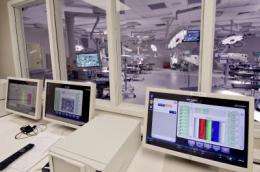USF Health's center for training and evaluating health professionals sets standards for quality care

Patients around the world will benefit from better training and testing of health professionals as USF Health opens its $38 million Center for Advanced Medical Learning and Simulation (CAMLS) in downtown Tampa.
Packed with learning tools that aren't found anywhere else in the world, CAMLS is expected to draw 30,000 health professionals from around the globe each year to train in advanced surgical skills, in interdisciplinary teams, and to have their skills evaluated by the best in the field.
Ultimately, USF Health leaders believe that CAMLS will lead to better and safer patient care across the U.S. – and beyond.
"CAMLS will lead the way to a transformation of how health professionals are trained and assessed across America," said Dr. Stephen Klasko, CEO of USF Health and dean of the USF Morsani College of Medicine. "The old standard 'see one-do one-teach one' model will become obsolete. Instead, patients will have the comfort of knowing their health professionals have been evaluated and are competent to care for them."
CAMLS' scope and devotion to better training already are drawing praise from national healthcare leaders who have seen the facility, which occupies an entire city block in downtown Tampa.
U.S. Health and Human Services Secretary Kathleen Sebelius said that CAMLS "will be on the map across the country and across the world." Dr. Darrell Kirch, president of the Association of American Medical Colleges, called CAMLS "an international example of where we're heading around teaching and assessing doctors and other healthcare professionals based on their competence."
"The technology is dazzling," Dr. Kirch said of CAMLS. "But what's most important to me is the positive impact it would have on patient care and patient outcomes."
CAMLS' grand opening is slated for March 30th. Features at the three-story, 90,000 square foot facility include:
- 39 surgical stations, more than the number found at many hospitals, with enough space for the entire healthcare team to train at once. Learners can set up in a 21-station surgical arena, as well as in smaller arenas and other sites, including a robotics suite with two da Vinci robots.
- A hybrid catheterization lab / operating room, the first such training facility in the world, designed to allow health professionals to move from performing an interventional procedure to open surgery in the same setting, without patients having to go through the additional risk of a time-consuming move.
- Another first-of-its-kind trauma operating room that can change environments to suit different training purposes, from providing soothing light and sounds for a complex surgery to mimicking the noise of an urban emergency department and even the desert light and explosive noises of the battlefield environment faced by combat medics.
- In the Virtual Patient Care Center, several standardized patient exam rooms and team training rooms, set up with audiovisual recording to allow for in-depth debriefing and analysis.
- A variety of realistic human patient simulators, from neonatal to adult, including combat casualty and birth simulators.
- Surgical simulators for endoscopics, laparoscopic, interventional vascular, urologic and gynecologic procedures.
- The Tampa Bay Research & Innovation Center, which will bring medical faculty, engineers and other experts together to develop new medical technologies and devices. The center will include machining and rapid prototyping capabilities, allowing new devices to be made, tested, and modified at CAMLS.
CAMLS already is partnering with several industry leaders, such as Stryker, Philips, Covidien, and Simbionix, to provide state-of-the-art training equipment at the facility. CAMLS also is working with the American College of Surgeons, the American College of Cardiology, the American College of Obstetricians and Gynecologists and other specialty societies to provide training for their members.
It's important to realize that CAMLS does more than train surgeons on the latest technology, said Dr. John Armstrong, chief medical officer of CAMLS. Instead, CAMLS is designed to provide training, often in a team environment, to a broad spectrum of health professionals. Doctors, nurses, surgery technicians, combat medics and others can learn together at CAMLS – and better teamwork means better care.
"In the past, we have trained health professionals as individuals, not as teams," Dr. Armstrong said. "If you look at medical errors, you can trace many of them back to issues of communication. We need to focus on how we communicate together."
CAMLS is designed to do that. That's one reason that the March 30th grand opening ceremony for CAMLS will feature Capt. Jeff Skiles, co-pilot of US Airways Flight 1549, the plane that landed safely on the Hudson. Capt. Skiles' experience shows how healthcare can become safer by borrowing training techniques from aviation, Dr. Klasko said.
"One of the interesting things about Capt. Skiles is that those two pilots had never flown together before," Dr. Klasko said. "But the level of their training was so high that they could function as an expert team in a crisis situation."
CAMLS is the latest innovation at USF Health, already a leader in transforming how health professionals learn. Those innovations include the SELECT program, a physician leadership program that chooses MD students based on their emotional intelligence, not just their academic prowess; a brand-new College of Pharmacy that trains students for a future based on electronic prescriptions and personalized medicine; and the structure of USF Health itself, which allows medical, nursing, public health and pharmacy students to learn together.
"At USF Health, we are re-imagining how health professionals learn at every stage in their career," Dr. Klasko said. "With CAMLS, we will transform how practicing health professionals learn new skills and work in teams. We are the incubator for healthcare transformation."
Provided by Edelman